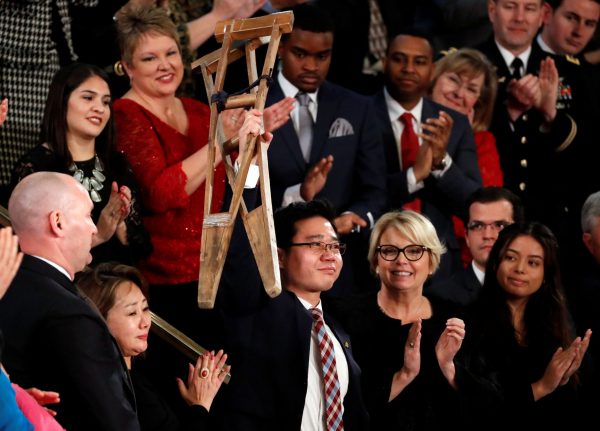In April 2018, South Korean President Moon Jae-in met with Kim Jong-un in a mainly symbolic summit that brought new enthusiasm to the idea that the intractable issues that have vexed the Korean Peninsula for so long can be resolved. US President Donald Trump has dialled down his fiery rhetoric, Kim Jong-un announced that North Korea will halt its intercontinental ballistic missile (ICBM) and nuclear tests and both Korean leaders agreed to pursue the finalisation of a peace treaty, to which Trump has thus far responded favourably.
Although all relevant stakeholders have offered grand gestures for peace, analysts are rightly concerned that North Korea may use its nuclear and ICBM programs to blackmail the international community into easing economic sanctions, rethinking its military alliances and ending the Korean War on Pyongyang’s own terms. Will South Korea, the United States and regional stakeholders be willing to pay the costs of reintegrating North Korea?
One exorbitant cost that appears to have been either forgotten or purposely ignored is that of the human rights of North Koreans. This issue was not emphasised during the Moon–Kim made-for-TV summit. In the past, Trump has called attention to North Korea’s abhorrent human rights situation. He invited North Korean defectors to the White House and criticised North Korea’s human rights record in his 2018 State of the Union address as well as in his speech to the United Nations General Assembly in 2017. It is unclear whether Trump will make this a point of emphasis in his upcoming summit with Kim Jong-un, or whether Trump fears that doing so would limit his ability to appear to have made a good deal.
Like his progressive, engagement-focussed predecessors, Kim Dae-jung and Roh Moo-hyun, Moon has a long track record of fighting human rights abuses in South Korea but is reluctant to raise serious human rights issues with North Korea. In the past, the United States focussed on North Korean human rights advocacy more than South Korea. If Trump fully retreats from this past emphasis on human rights and instead merely plays good cop to Moon’s good cop, the last few years of momentum to advocate for North Korean human rights issues could be lost.
Refusing to advocate forcefully for the human rights of North Koreans can be interpreted as a cost of doing business with North Korea in the push for engagement. But this argument assumes a dichotomy between human rights and ‘hard’ security issues that does not necessarily exist.
North Korea uses forced labour abroad in shadowy illicit networks that are linked to arms sales. The North Korean regime again violated a long-standing international norm in its assassination of Kim Jong-un’s brother, Kim Jong-nam, using VX nerve gas, a designated ‘weapon of mass destruction’. The 2014 UN Commission of Inquiry report found that the North Korean government uses food as a means of control and punishes groups deemed unfavourable to the regime. Any resumption of aid and economic engagement with North Korea must take into account the human rights environment and be monitored to ensure that aid is delivered to the most vulnerable. In fact, legislation in both South Korea and the United States mandates this.
Moreover, North Korea’s human rights abuses are not contained within its own borders or to its own citizens. Pyongyang’s shadowy engagement with pariah states proliferates human rights abuses abroad by providing weapons and security services to other abusers. This contributes to greater suffering and enables rogue regimes to maintain hard power. There is ample evidence of this, from North Korea’s dealings with the Democratic Republic of the Congo to Syria. Former US president Obama’s stand down from enforcing a ‘red line’ over Bashar al-Assad’s chemical weapons use in Syria and Trump’s air strikes against al-Assad’s forces in response to his chemical weapons attacks both demonstrate that the hard security links to human rights violations have ramifications for geopolitics and national security across the globe.
As Trump and Moon work together towards a deal with North Korea that continues to lower military tensions on the Peninsula, both must understand that human rights abuses in North Korea are not an isolated problem. They should push to include human rights in any discussions with North Korea not only because it is the right thing to do for the North Koreans who suffer, but because human rights must also be part of their strategy to maintain peace and stability. The US and South Korean people, who are fortunate enough to enjoy the freedoms of democracy, should demand it of their leaders.
Tom Le is an Assistant Professor of Politics at Pomona College.
Kent Boydston researches politics and economics in East Asia and is based in Washington, DC. The views expressed are his own.

